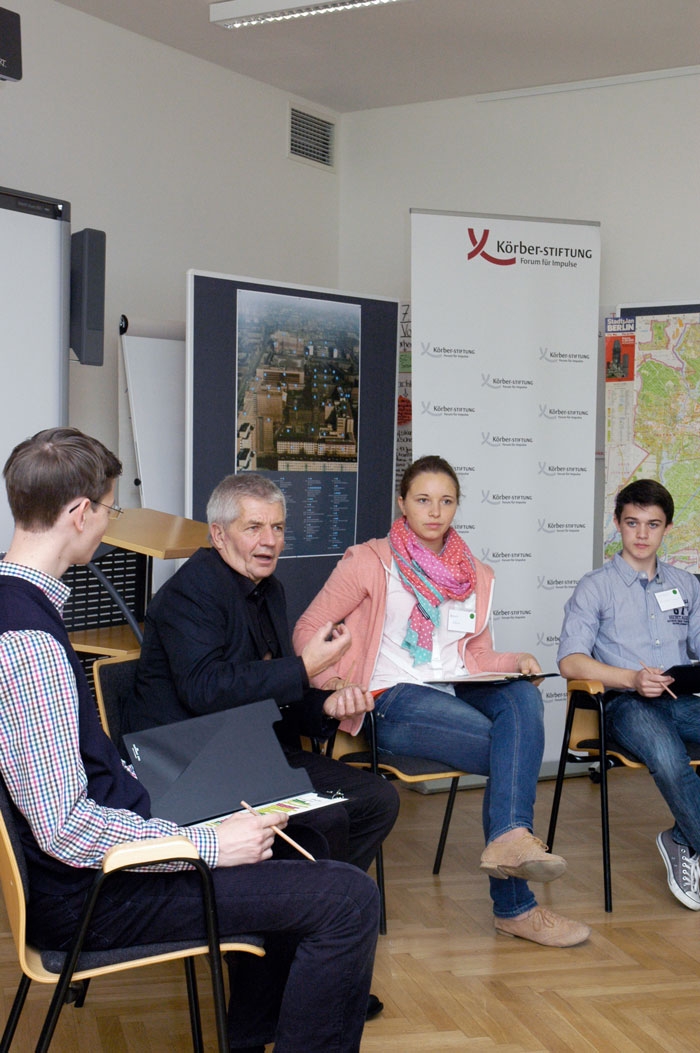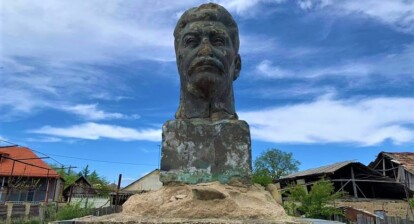June 2014: the Koerber Foundation and the The Federal Commissioner for the Records of the State Security Service of the former German Democratic Republic invited 36 winners of the German Federal President’s History Competiton to learn about the lives of young people who were targeted by the secret police, to visit the archives, talk to contemporary witnesses and, last but not least, interview the Commissioner himself, Mr. Roland Jahn. Read the report of the seven young people who prepared and conducted the interview.
Roland Jahn: From Opponent to Leader in Stasi Records Reappraisal
 During the Peaceful Revolution of 1989, ten thousand citizens of the GDR protested against the dictatorship of the SED (Socialist Unity Party of Germany). On 15 January, 1990, some gained control of the Stasi buildings in order to save their personal records from destruction.
During the Peaceful Revolution of 1989, ten thousand citizens of the GDR protested against the dictatorship of the SED (Socialist Unity Party of Germany). On 15 January, 1990, some gained control of the Stasi buildings in order to save their personal records from destruction.
The Agency of the Federal Commissioner for the Stasi Records (BStU) was founded to safeguard and administer these records. Moreover, the institution provides people access to files that concern them and for the purpose of scientific research. Since 2011 Roland Jahn has been leading this institution. He was an active member of the opposition in the GDR. Thus, he was observed and arrested by the Stasi and finally expatriated against his will. However, Jahn continued his efforts against the breaches of basic human rights in the GDR. We had the pleasure to interview him as head of this agency.
We asked him in which way his past influences his approach towards the sensitive issue of reappraisal of the activities of the Stasi. Mr. Jahn stated that there is always a certain conflict of interest. However, he emphasized that his past experiences motivate him to fulfill his tasks. During his term of office, he constantly improved his understanding of the Stasi. Moreover, he has been working for 25 years as a journalist which enables him to view the records with appropriate objectivity.
From Stasi to NSA
Since Mr. Jahn himself had been spied on by the Stasi we were wondering about his opinion on the current discussion about the NSA secret surveillance programme. We were interested in how far his point of view matters in current politics. He said that the Bundestag (German parliament) is responsible to consider security issues. At the same time there is an exchange of opinions between political parties and non-governmental organisations. They all contribute to the discussion about the increasing conflict between the right to privacy and the need for national security. His duty is to guarantee proper access to the records. This is of great importance because the Stasi had the power to make or break careers and lives. It is therefore crucial for the affected people to find out the truth, to understand the past and to move on.
Roland Jahn’s Vision for the BStU
During our research we were surprised to learn that former Stasi employees still work for the BStU. They were needed to understand the complex archival system of the secret police. Even though Mr. Jahn personally does not mind working with them, he as well as his predecessors tried to transfer them to other ministries. Mr. Jahn defended his decision by referring to talks he had with people who had been spied on. They told him about their hesitation or even fear to have to face an Ex-Stasi employee when they want to see their files. Mr. Jahn compared this situation to “a slap in the face of the victims”.
But his plans were opposed by the staff council. The council argues that by now most of the former Stasi members have been working several times longer for the BStU than they were employed by the secret police. And none of them was directly connected with the illegal activities as they worked as cooks or bodyguards, for instance. In our intense and enlightening interview with the Federal Commissioner he pointed out more than once that „the better we understand dictatorship, the better we can shape democracy“. Nevertheless, the future of the BStU is uncertain, because the Bundestag is to decide about its future after 2019.
Authors: Antonia, Christophe, Johannes, Marcel, Moritz, Liska and Sirkka.





